Building Trust
en Carte – 7 dec 2005
| Toate formatele și edițiile | Preț | Express |
|---|---|---|
| Paperback (1) | 438.28 lei 6-8 săpt. | |
| Lexington Books – 28 dec 2009 | 438.28 lei 6-8 săpt. | |
| Hardback (1) | 700.68 lei 6-8 săpt. | |
| Rowman & Littlefield – 30 dec 2009 | 700.68 lei 6-8 săpt. |
Preț: 477.21 lei
Preț vechi: 622.53 lei
-23% Nou
Puncte Express: 716
Preț estimativ în valută:
91.31€ • 99.50$ • 76.95£
91.31€ • 99.50$ • 76.95£
Comandă specială
Livrare economică 04-16 aprilie
Doresc să fiu notificat când acest titlu va fi disponibil:
Se trimite...
Preluare comenzi: 021 569.72.76
Specificații
ISBN-13: 9780791466353
ISBN-10: 0791466353
Pagini: 213
Dimensiuni: 174 x 237 x 18 mm
Greutate: 0.43 kg
Editura: State University Press of New York (SUNY)
ISBN-10: 0791466353
Pagini: 213
Dimensiuni: 174 x 237 x 18 mm
Greutate: 0.43 kg
Editura: State University Press of New York (SUNY)
Notă biografică
Aaron M. Hoffman is Assistant Professor of Political Science at Purdue University.
Descriere
Descriere de la o altă ediție sau format:
This book studies five ethnic communities_South Asian Americans, African Americans, Japanese Americans, Mexican Americans, and Samoan Americans_to understand how their members feel about being studied by researchers. Focusing on trust-building as a necessary process in doing good community research, this book offers the reader culturally sensitive
This book studies five ethnic communities_South Asian Americans, African Americans, Japanese Americans, Mexican Americans, and Samoan Americans_to understand how their members feel about being studied by researchers. Focusing on trust-building as a necessary process in doing good community research, this book offers the reader culturally sensitive
